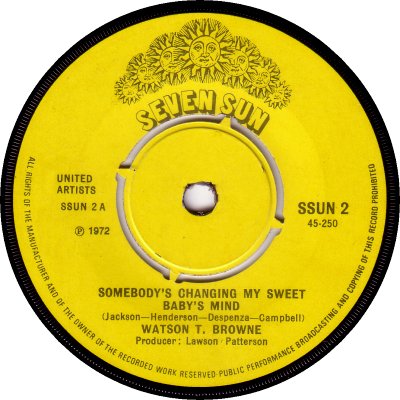
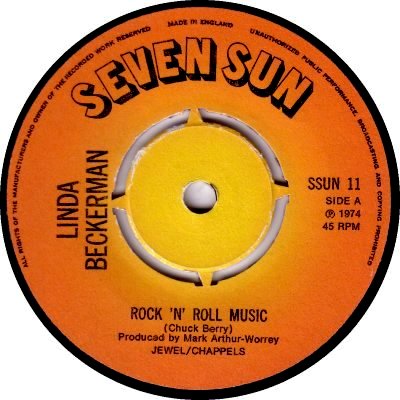
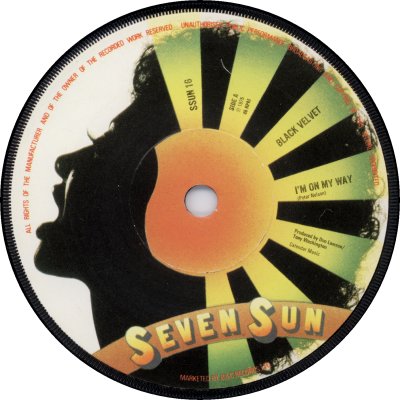

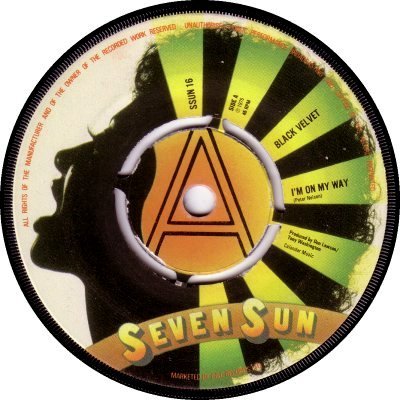
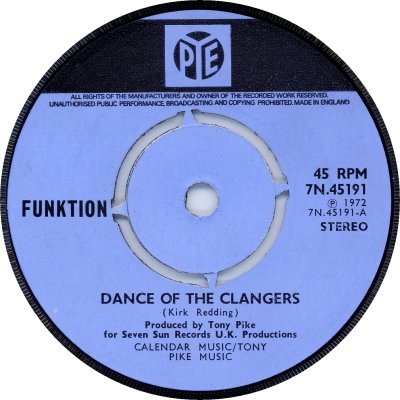
A rather uncommon label from 1972-75, owned by Don Lawson of Calendar Music. Lawson had placed several singles by Black Velvet (whom he managed) and Watson T. Browne with MAM Records (q.v.) in 1971, but 'Record Retailer' of the 13th of November of that year said that he was preparing to take a step beyond record production and launch his own label in the company of Milton Samuels of Beacon Records (q.v.). 'RR' of the the 8th of January 1972 reported that the new 'pop' label was to make its debut on the 21st of that month, with distribution via CBS, Beacon and the BIRD network; the article added that singles by Bryan Clarke and by Black Velvet were intended for release in the future, but the Clarke release seems to have been delayed. The plan for CBS to distribute Seven Sun appears to have fallen through, as an advert for the second Seven Sun single in 'Music Week' of the 22nd of April gave the distributors as EMI; EMI also handled manufacture of these early releases.
The arrangement with Beacon and EMI proved to be short-lived: Beacon seems to have undergone some kind of trauma in the early summer of 1972, which appears to have led to a break with Seven Sun after just three singles had been issued. The label on these first singles was yellow with seven suns across the top of it (1), and their matrix numbers were part of a series used by Beacon. That same year Seven Sun took a brief bow in Canada with a single by Abraka, 'Afeeka Is Calling You' b/w 'Freedom Freedom' (SS-001; 1972), which never saw the light of day in the UK. 'MW' of the 26th of August 1972 claimed that some of the company's product was to be released on Boot in Canada and Morks Musikforlag in Denmark, with a single by ESP being the first fruits, but there's no sign that anything resulted. A week later 'MW' of the 2nd of September reported that Seven Sun had signed a three-year distribution deal with Pye, and that several records were scheduled for release; the Abraka single was among those listed (despite that, it doesn't seem to have ever been released here) but the first was to be by Johnny Orlando. In the event the deal seems to have ended up as a one-year licensing agreement: for that period the company's products came out on the Pye label with Pye catalogue numbers, Seven Sun being given a production credit at the bottom of the label (6).
Seven Sun reappeared as an actual label in 1973. 'Billboard' of the 20th of October, referring to the 'current licensing deal with Pye', said that when that deal ended President would take over distribution. Sure enough, November saw Seven Sun back on the scene, with a new orange-and-yellow label design (2). Catalogue numbers started where they had left off, with SSUN-4. 'Music Master' says that President handled SSUN-4 and SSUN-5, distribution being via Enterprise (one of the companies then responsible for the distribution of President records), which agrees with the Billboard report. Seven Sun seems to have retained its links to President for twelve months or so: 'Music Week' of the 16th of November 1974 lists it along with several other President family labels as still being distributed by Enterprise. During this period promo copies were marked in the President family style, with a large hollow 'A' (4). Manufacture seems to have been by British Homophone, which was part of the President group at the time. Presumably because of the ending of the deal with President there was a gap of some eight months after SSUN-13 and what turned out to be the final trio of singles.
The last three Seven Sun records were the fruit of an exclusive licensing deal with B&C, according to 'MW' (31st May 1974). Their labels had a rather striking head-and-rays design (3) with a reference to B&C at the bottom - I thought that the 'A's on them (5) merely emphasized 'A' sides, rather than denoting promos, but having found one without an 'A' on it I've had to think again. Pressing of these records was by CBS, as it was for B&C's own material at the time. Sadly B&C was in deep financial trouble at that point - it seems reasonable to assume that Seven Sun's management were unaware of that - and roughly a month later it was put into the hands of the liquidator, which of course meant the end of the Seven Sun arrangement. 'Music Week' gives a release date of the 21st of June for these final three singles, which suggests that they were only available for a week before B&C hit the buffers; that may be the reason why 'promo' copies of them seem to be much more common than 'issues'. A Seven Sun production, 'What Am I To Do' b/w 'So Good To See You' by Bryan Clarke (SF-1107; 7/75), came out on Safari Records (q.v.) the following month, which suggests that an arrangement had quickly been made with that company after the B&C debacle. It seems reasonable to suppose that that single had been intended to be SSUN-17.
Seven Sun's output seems to have been divided between Soul and Pop in roughly equal proportions, with the likes of Black Velvet and Watson T. Browne representing the former and Jet, Frame and Linda Beckerman the latter. Linda Beckerman's cover of Chuck Berry's 'Rock 'n' Roll Music' b/w 'Joe' (SSUN-11; 6/74) is actually a decent bit of Glam, in my opinion - she sounds as though she might be Suzi Quatro's younger sister. Numbering of the company's singles was in an SSUN-0 series from start to finish; there were fifteen releases on the label in Britain plus three overseas-only ones. The number SSUN-9 seems not to have been issued, but there were a couple of singles issued on Seven Sun in Germany at around that time, either of which might possibly have been intended to fill that slot: they were Frame's 'Keep Those Blues On The Run' b/w 'Girl What You Trying To Do' (DL-25 623) and 'Trucking Song' b/w 'Substitute', and by Skin (Seven Sun, DL-25 642). SSUN-13, 'The Champ', was by '60s hitmaker P. J. Proby, but neither he nor any of the other artists managed to get Seven Sun into the Charts. Seven Sun's only UK album, 'Can You Feel It' by Black Velvet (SUNLP-1; 1973) is collectable. In 1976 Don Lawson launched the Calendar label (q.v.), which appears to have been a successor to Seven Sun and featured several artists from the Seven Sun roster.
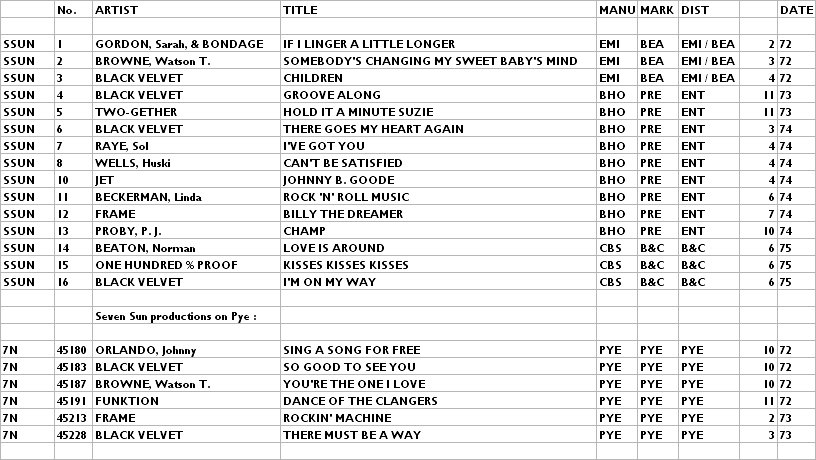


Copyright 2006 Robert Lyons.

